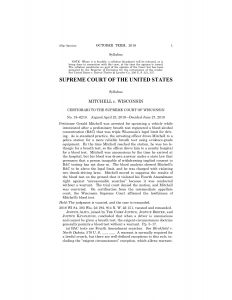
Have you ever wondered whether a police officer needs to request a search warrant when attempting to obtain a blood sample from an unconscious suspected drunk driver? The United States Supreme Court recently answered that question. The Court agreed that there is no question that our Fourth Amendment constitutional right against unreasonable searches and seizures applies when blood is taken from the body of a person suspected of driving under the influence (DUI, DWI, or OUI). However, the Court was quick to recognize that certain exceptions apply to that constitutional right. One of those exceptions applies when exigent circumstances exists that makes it difficult or impossible for an officer to obtain a warrant.
On June 27, 2019, the United States Supreme Court issued an opinion ruling that the exigent–circumstances exception to our Fourth Amendment right applies when a suspected drunk driver is unconscious. This case, Mitchell v. Wisconsin, specifically held that,
“When a breath test is impossible, enforcement of the drunk-driving laws depends upon the administration of a blood test. And when a police officer encounters an unconscious driver, it is very likely that the driver would be taken to an emergency room and that his blood would be drawn for diagnostic purposes even if the police were not seeking BAC information. In addition, police officers most frequently come upon unconscious drivers when they report to the scene of an accident, and under those circumstances, the officers’ many responsibilities—such as attending to other injured drivers or passengers and preventing further accidents—may be incompatible with the procedures that would be required to obtain a warrant. Thus, when a driver is unconscious, the general rule is that a warrant is not needed.” (Emphasis added)
Of course, some states, such as Tennessee, have constitutions or legislation providing greater personal protections than those provided by the federal constitution. Under current Tennessee law, for instance, Tennessee Code Annotated Section 55–10–406(i) requires a search warrant or a recognized exigent circumstance exception to apply before obtaining a blood sample from an unconscious driver without a search warrant.
About the Author: Steven Oberman has been licensed in Tennessee since 1980, and successfully defended over 2,500 DUI defendants. Among the many honors bestowed upon him, Steve served as Dean of the National College for DUI Defense, Inc. (NCDD) and currently serves as chair of the National Association of Criminal Defense Lawyers DUI Committee. Steve was the first lawyer in Tennessee to be Board Certified as a DUI Defense Specialist by the NCDD.
He is the author of DUI: The Crime & Consequences in Tennessee, updated annually since 1991 (Thomson-West), and co-author with Lawrence Taylor of the national treatise, Drunk Driving Defense, 8th edition (Wolters Kluwer/Aspen). Steve has served as an adjunct professor at the University of Tennessee Law School since 1993 and has received a number of prestigious awards for his faculty contributions. He is a popular international speaker, having spoken at legal seminars in 30 states, the District of Columbia and three foreign countries. After being named a Fulbright Scholar, Steve was honored to teach as an Adjunct Professor at the University of Latvia Law School in the capital city of Riga, Latvia during the Spring Semester of 2019.
If you would like to contact the author, please visit his website.